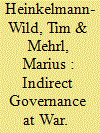| Srl | Item |
| 1 |
ID:
181662


|
|
|
|
|
| Summary/Abstract |
Despite the Lisbon Treaty's modifications in the foreign and security policy domain, the EU has frequently relied on third parties to address external conflicts and crises. Using the Ukrainian conflict as a case study, this article adopts the orchestration model to explain why and how the EU enlists intermediary actors over which it has no formal control to pursue its objectives. It finds that in this conflict the EU outsourced part of its crisis management activities to the Organization for Security and Co-operation in Europe because it lacked the civilian and military capabilities, as well as the regulatory competence and reputation to challenge Russia. Indeed, the Ukrainian case shows that orchestration has emerged as a crucial governance arrangement for the functioning of EU crisis management, raising serious questions about the EU overall capacity to act as a security provider in an international system marred by contestation and hard security concerns.
|
|
|
|
|
|
|
|
|
|
|
|
|
|
|
|
| 2 |
ID:
183149


|
|
|
|
|
| Summary/Abstract |
Instead of attacking their adversaries directly, states often do so indirectly by supporting rebel groups. While these support relationships vary considerably, existing research lacks a comprehensive account thereof. To explain states’ choice of support, we suggest differentiating between two modes of support relationships according to the control opportunities they offer states over rebels: while delegation enables “hands-on” control, “hands-off” orchestration allows for plausible deniability and does not harm rebels’ local legitimacy. We argue that sponsors prefer orchestration when “hands-on” control can be substituted by goal alignment or competition; and they prefer delegation when the conflict is highly salient. Tests using global data for the period 1975-2009 support the first two expectations. Surprisingly, states’ capabilities also render “hands-off” orchestration more likely. The paper advances the understanding of external rebel support by transferring insights from indirect governance theory to the study of indirect wars and putting it to statistical test.
|
|
|
|
|
|
|
|
|
|
|
|
|
|
|
|
| 3 |
ID:
184668


|
|
|
|
|
| Summary/Abstract |
Intergovernmental, regional, and international organizations play an active role in the governance of transnational crises. In the context of the COVID-19 pandemic in Latin America, the World Health Organization and the Pan-American Health Organization have been linked with multiple actors and levels of decision-making, putting into practice what the literature on global governance refers to as indirect governance by orchestration. This article shows that, in practice, the mechanisms of orchestration have established heterogeneous models of coordination and action that, in situations of transnational crisis, allow these organizations to bring together resources, capacities, and authority.
|
|
|
|
|
|
|
|
|
|
|
|
|
|
|
|
| 4 |
ID:
097318


|
|
|
|
|
| Publication |
2010.
|
| Summary/Abstract |
How effective was the Indian government in sending clear, coercive signals and orchestrating them into coherent messages during 'Operation Parakram' in 2001-02? This study finds that compellence was hampered by three factors: (1) the government kept changing its demands; (2) the lack of adequate civil-military coordination; and (3) the government engaged in a dual-track policy of direct coercion of Pakistan, while simultaneously engaging the United States to put pressure on Pakistan. Ultimately, these two policy strands worked at cross-purposes to each other.
|
|
|
|
|
|
|
|
|
|
|
|
|
|
|
|